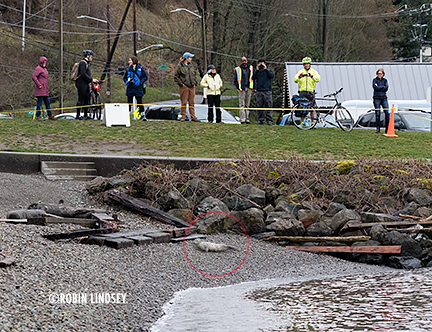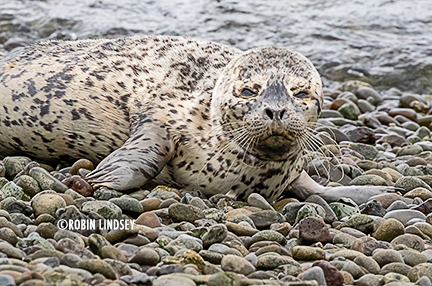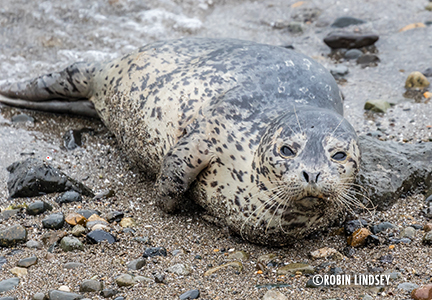Granite
Tough times for seal pups and the volunteers who protect them
Mar/17/17 07:31 PM
 Seal Sitters’ hotline received several calls early Tuesday morning about a seal pup onshore at the small cove just south of the West Seattle water taxi landing.
Seal Sitters’ hotline received several calls early Tuesday morning about a seal pup onshore at the small cove just south of the West Seattle water taxi landing. In a heavy rain, First Responders Robin and Nina established a perimeter to give the pup some space despite being about 20 feet from a very busy sidewalk. Commuters, rushing to catch the ferry or by bicycle to downtown, slowed down to admire the small, light-colored pup and read the informational signs on sandwich boards and stakes.

It is not unusual at all for pups to rest 12 hours or more onshore. Like many of the weaned seal pups Seal Sitters looks over during winter months, Granite was too thin. We didn’t realize quite how thin and dehydrated he truly was until late in the day, when he moved down to the water’s edge, allowing us to better evaluate his body condition. Granite was also increasingly lethargic.
Due to the late hour and early evening closure of PAWS Wildlife Center in Lynnwood, it was determined that a rescue would take place the following morning, knowing full well that euthanasia might be necessary. Capture and handling causes tremendous stress to a wild animal and that in itself can sometimes be the tipping point between life and death. It is not taken lightly. Granite did not seem to be suffering and there was no coughing or discharge from the nose or mouth, signs of respiratory disorders. There were no visible wounds. It was our fervent hope that the pup would return to Elliott Bay for at least several hours, foraging on squid or small fish to gain strength and hydrate.
Granite went back into the bay about 7:45 pm, but returned shortly after to the same spot on the beach where, to our knowledge, he spent the remainder of the night. Volunteers were disheartened that he had returned without nourishment.
At 6:30 am the following morning, Robin checked the beach in the rain and dark. It was empty. Sadly, she could see Granite’s body submerged offshore, just out of reach in waters too deep for wading. Within minutes, the tiny body disappeared as the tide receded, swept out into the black waves. The pup had died overnight.
First Responder Lynn arrived with a net and volunteer John helped in the search, but there was no sign of the pup. By odd coincidence, Seal Sitters volunteer and dive instructor Richard Anderson happened to appear with a colleague for a dive in the popular cove. They retrieved the pup, who was placed on the pebbled beach, given a quick exam and transferred into a cooler. Just before pulling out of the parking lot to make the drive to Lakewood for necropsy, Robin watched a woman with her dog traverse the cove, across that same spot where the weak and vulnerable pup had lain.

A seal pup’s condition can take a sudden and tragic turn for the worse - in a matter of days. Up to 50% of harbor seal pups will not survive the first year of life. Contributing factors to pup mortality are: conditions associated with fetal development or premature birth, disease, predation by shoreline predators or domestic dogs, infection, dehydration or starvation.
Thanks to the volunteers and public who ensured Granite some dignity at his last haul-out, free from disturbance or harm. It is very sad for all involved, but there is small comfort in knowing that the beautiful, intricately spotted pup died in peace on his little chosen beach.
It's raining cats and dogs - and seal pups
Mar/14/17 01:00 PM

Longtime Hotline Operator Larry’s phone buzzed just before 3 with a call about a seal pup trying to come ashore at Jack Block Park’s public beach, notorious for illegally off-leash dogs. So, First Responder Robin zipped down the hill and was at the nearby location within minutes. In the pouring rain, a small, thin pup was sound asleep on a little sliver of sand at the far corner of the beach. Yellow “Protected Marine Mammal” tape was stretched across the only public access point at the opposite end. First Responder Lynn arrived to take a quick peek at the little one as well.
Every 15 minutes or so, the incoming tide lapped over the pup’s rear flippers forcing him to keep moving a few feet further down the beach. The pup was thin and seemed exhausted. Once Robin was convinced the pup might actually remain onshore, she called Volunteer Scheduler Colette who checked the online calendar. About 1/2 hour later, while Robin was rummaging in her car trying to find a dry pair of gloves, the pup left the beach. Of course, volunteer Kate arrived minutes later, only to miss seeing the pup.
After looking at photos of the seal’s stunningly marked coat, Kate remarked that the pattern looked just like granite. They waited patiently for quite some time for Granite to return for a rest, but finally Kate was sent home. After hanging out awhile longer and still no sign of a glistening head out in the flat gray, rain-splattered bay, Robin started removing the tape and cones from the sidewalk.
Just before leaving, she did a final scan of the beach. What was that light little shape at the tide line at the far opposite end? Wood? A rock? It was sneaky little Granite. Hustling down to the wide cement walkway leading to the Jack Block pier, Robin established yet another perimeter to keep the occasional curious people back a reasonable distance. The tired pup was just a foot of two beneath the wire fencing along the landing. Once again, volunteers headed down to help out. Just minutes before Betsy and Stephen arrived, a series of waves swept over Granite and he swam off. His head broke the surface of Elliott Bay just long enough to say goodbye and then, he vanished.
The beach was monitored until after high tide around 6:40pm. Jack Block Park closed at dusk, so volunteers did not need to worry about his safety if he returned during the night.







